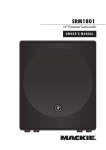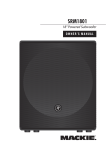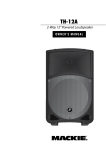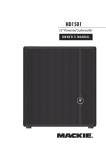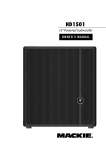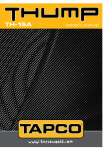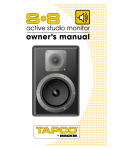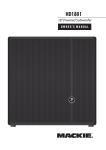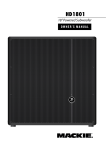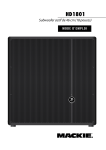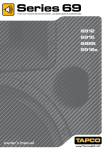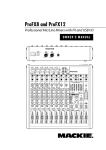Download Mackie TH-18S Owner`s manual
Transcript
TH-18s 18” Powered Subwoofer OWNER’S MANUAL Important Safety Instructions 1. 2. 3. 4. 5. 6. 7. Read these instructions. Keep these instructions. Heed all warnings. Follow all instructions. Do not use this apparatus near water. Clean only with a dry cloth. Do not block any ventilation openings. Install in accordance with the manufacturer’s instructions. 8. Do not install near any heat sources such as radiators, heat registers, stoves, or other apparatus (including amplifiers) that produce heat. 9. Do not defeat the safety purpose of the polarized or grounding-type plug. A polarized plug has two blades with one wider than the other. A grounding-type plug has two blades and a third grounding prong. The wide blade or the third prong are provided for your safety. If the provided plug does not fit into your outlet, consult an electrician for replacement of the obsolete outlet. 10. Protect the power cord from being walked on or pinched particularly at plugs, convenience receptacles, and the point where they exit from the apparatus. 11. Only use attachments/accessories specified by the manufacturer. 12. Use only with a cart, stand, tripod, bracket, or PORTABLE CART WARNING table specified by the manufacturer, or sold with the apparatus. When a cart is used, use caution when moving the cart/apparatus combination to avoid injury from tip-over. 13. Unplug this apparatus during lightning storms or when unused for long periods of time. 14. Refer all servicing to qualified service personnel. Servicing is required when the apparatus has been damaged in any way, such as powersupply cord or plug is damaged, liquid has been spilled or objects have fallen into the apparatus, the apparatus has been exposed to rain or moisture, does not operate normally, or has been dropped. 15. This apparatus shall not be exposed to dripping or splashing, and no object filled with liquids, such as vases or beer glasses, shall be placed on the apparatus. 16. Do not overload wall outlets and extension cords as this can result in a risk of fire or electric shock. 17. This apparatus has been designed with Class-I construction and must be connected to a mains socket outlet with a protective earthing connection (the third grounding prong). 18. This apparatus has been equipped with a rocker-style AC mains power switch. This switch is located on the rear panel and should remain readily accessible to the user. 19. The MAINS plug or an appliance coupler is used as the disconnect device, so the disconnect device shall remain readily operable. CAUTION AVIS RISK OF ELECTRIC SHOCK. DO NOT OPEN RISQUE DE CHOC ELECTRIQUE. NE PAS OUVRIR CAUTION: TO REDUCE THE RISK OF ELECTRIC SHOCK DO NOT REMOVE COVER (OR BACK) NO USER-SERVICEABLE PARTS INSIDE. REFER SERVICING TO QUALIFIED PERSONNEL ATTENTION: POUR EVITER LES RISQUES DE CHOC ELECTRIQUE, NE PAS ENLEVER LE COUVERCLE. AUCUN ENTRETIEN DE PIECES INTERIEURES PAR L'USAGER. CONFIER L'ENTRETIEN AU PERSONNEL QUALIFIE. AVIS: POUR EVITER LES RISQUES D'INCENDIE OU D'ELECTROCUTION, N'EXPOSEZ PAS CET ARTICLE A LA PLUIE OU A L'HUMIDITE The lightning flash with arrowhead symbol within an equilateral triangle is intended to alert the user to the presence of uninsulated "dangerous voltage" within the product's enclosure, that may be of sufficient magnitude to constitute a risk of electric shock to persons. Le symbole éclair avec point de flèche à l'intérieur d'un triangle équilatéral est utilisé pour alerter l'utilisateur de la présence à l'intérieur du coffret de "voltage dangereux" non isolé d'ampleur suffisante pour constituer un risque d'éléctrocution. The exclamation point within an equilateral triangle is intended to alert the user of the presence of important operating and maintenance (servicing) instructions in the literature accompanying the appliance. Le point d'exclamation à l'intérieur d'un triangle équilatéral est employé pour alerter les utilisateurs de la présence d'instructions importantes pour le fonctionnement et l'entretien (service) dans le livret d'instruction accompagnant l'appareil. 2 20.NOTE: This equipment has been tested and found to comply with the limits for a Class B digital device, pursuant to part 15 of the FCC Rules. These limits are designed to provide reasonable protection against harmful interference in a residential installation. This equipment generates, uses, and can radiate radio frequency energy and, if not installed and used in accordance with the instructions, may cause harmful interference to radio communications. However, there is no guarantee that interference will not occur in a particular installation. If this equipment does cause harmful interference to radio or television reception, which can be determined by turning the equipment off and on, the user is encouraged to try to correct the interference by one or more of the following measures: • Reorient or relocate the receiving antenna. • Increase the separation between the equipment and the receiver. • Connect the equipment into an outlet on a circuit different from that to which the receiver is connected. • Consult the dealer or an experienced radio/TV technician for help. CAUTION: Changes or modifications to this device not expressly approved by LOUD Technologies Inc. could void the user's authority to operate the equipment under FCC rules. 21. This apparatus does not exceed the Class A/Class B (whichever is applicable) limits for radio noise emissions from digital apparatus as set out in the radio interference regulations of the Canadian Department of Communications. ATTENTION — Le présent appareil numérique n’émet pas de bruits radioélectriques dépassant las limites applicables aux appareils numériques de class A/de class B (selon le cas) prescrites dans le réglement sur le brouillage radioélectrique édicté par les ministere des communications du Canada. 22. Exposure to extremely high noise levels may cause permanent hearing loss. Individuals vary considerably in susceptibility to noise-induced hearing loss, but nearly everyone will lose some hearing if exposed to sufficiently intense noise for a period of time. The U.S. Government’s Occupational Safety and Health Administration (OSHA) has specified the permissible noise level exposures shown in the following chart. According to OSHA, any exposure in excess of these permissible limits could result in some hearing loss. To ensure against potentially dangerous exposure to high sound pressure levels, it is recommended that all persons exposed to equipment capable of producing high sound pressure levels use hearing protectors while the equipment is in operation. Ear plugs or protectors in the ear canals or over the ears must be worn when operating the equipment in order to prevent permanent hearing loss if exposure is in excess of the limits set forth here: Duration, per day in hours 8 6 4 3 2 1.5 1 Sound Level dBA, Slow Response 90 92 95 97 100 102 105 0.5 110 0.25 or less 115 Typical Example Duo in small club Subway Train Very loud classical music Greg and Ben screaming at Troy about deadlines Loudest parts at a rock concert WARNING — To reduce the risk of fire or electric shock, do not expose this apparatus to rain or moisture. CONTENTS What? Me read a manual? SAFETY INSTRUCTIONS............................................ 2 GETTING STARTED.................................................... 4 INTRODUCTION....................................................... 5 HOOKUP DIAGRAMS............................................... 6 MACKIE TH-18s FEATURES ...................................... 8 1. IEC AC RECEPTACLE AND FUSE...................... 8 2. POWER . .................................................... 8 3. INPUTS....................................................... 9 4. FULL RANGE OUTPUTS................................. 9 5. HIGH PASS OUTPUTS................................... 9 6. POLARITY................................................... 9 7. LEVEL........................................................ 10 8. THERMAL LED............................................ 10 9. OL LED...................................................... 10 10.SIGNAL LED............................................... 10 11.POWER LED............................................... 10 INS AND OUTS OF POLARITY.................................. 11 PROTECTION CIRCUITS........................................... 12 LIMITING............................................................... 12 OVEREXCURSION PROTECTION.............................. 12 THERMAL PROTECTION.......................................... 12 PLACEMENT........................................................... 12 CARE AND MAINTENANCE...................................... 12 APPENDIX A: SERVICE INFORMATION..................... 13 APPENDIX B: CONNECTIONS ................................. 15 APPENDIX C: TH-18s SPECIFICATIONS.................... 16 MACKIE LIMITED WARRANTY................................. 17 Before you begin, please make sure you read the Safety Instructions on page 2 and Getting Started on page 4. Your new Mackie TH-18s powered subwoofers are designed to set up quickly and operate easily. We know it’s often seen as a sign of weakness to read a manual, along with asking for directions when lost, but we hope you will read the rest of the manual, at least while nobody is looking. It is important to keep your receipt in a safe place, and not a bad idea to write your product information below for future reference (i.e., insurance claims, tech support, return authorization, etc.). Please write the serial number for your TH-18s here (or for both TH-18s’s if you have two) for future reference (i.e., insurance claims, tech support, return authorization, etc.): Subwoofer 1 Subwoofer 2 Purchased at:___________________________________ Date of Purchase:_____________ Don’t forget to visit our website at www.mackie.com for more information about this and other Mackie products. Part No. SW0786 Rev. A 01/10 ©2010 LOUD Technologies Inc. All Rights Reserved. 3 Getting Started The following steps will help you set up your subwoofer(s) quickly. INITIAL SETTINGS: 1. Turn the LEVEL control on the rear panel all the way down. 2. Turn the POWER switch OFF. CONNECTIONS: 1. Connect the line-level signal from a mixer (or other signal source) to the INPUT jack on the TH-18s rear panel (XLR connector). If you are operating the system in stereo, connect INPUT B, as well. 2. Connect the supplied AC power cord to the IEC socket on the back of the subwoofer. Plug the other end into an AC outlet properly configured with the correct voltage as indicated just above the IEC socket. TURN IT ON: 1. Turn the POWER switch ON. 2. Start your signal source (mp3 player, CD, DAW, band, or whatever), but leave the master level control on your mixer down. 3. Slowly turn up the LEVEL control on the TH-18s to the “U” (unity gain) mark at the center position. 4. Adjust the master volume on your mixer to a comfortably loud listening level. If the volume from the subwoofer gets really loud, really fast, try turning down the LEVEL control on the TH-18s a bit. If the subwoofers don’t get loud enough, turn up the LEVEL control to achieve a good balance of master volume control and loudness from the subwoofer. Now that you have your subwoofers working, it’s time to hunker down and read the rest of this manual… especially the following: ADDITIONAL TIDBITS OF WIDSDOM: • Never listen to loud music for prolonged periods. Please see the Safety Instructions on page 2 for information on hearing protection. • When you shut down your equipment, turn off the TH-18s subwoofers first to prevent thumps and other noises generated by any upstream equipment from coming out the speakers. When powering up, turn on the TH-18s last, but just before your full-range loudspeakers. • Save the shipping boxes and packing materials! You may need them someday. Besides, your cat will love playing in them and jumping out at you unexpectedly. Remember to pretend like you are surprised! • Save your sales receipt in a safe place. • Record the serial number in the space provided on page 3, along with where and when you bought it. THERMAL OL SIGNAL POWER LEVEL - 6dB OUTPUTS A HIGH PASS B A FULL RANGE B R +6dB POL ARITY TH-18s NORMAL INVERT ACTIVE SOUND REINFORCEMENT SUBWOOFER A INPUTS B WARNING: TO REDUCE THE RISK OF FIRE OR ELECTRIC SHOCK, DO NOT EXPOSE THIS EQUIPMENT TO RAIN OR MOISTURE. DO NOT REMOVE COVER. NO USER SERVICEABLE AVIS: RISQUE DE CHOC ELECTRIQUE — NE PAS OUVRIR PARTS INSIDE. REFER SERVICING TO QUALIFIED PERSONNEL. SERIAL NUMBER POWER ON FUSE: T10AH AC250V 4 REVISION Introduction Thank you for choosing the Mackie Thump TH-18s subwoofer. Mackie’s Thump Series powered loudspeakers achieve the perfect balance of power, portability, and most importantly, value. Designed by the same team that produced the best-selling Mackie SRM450v2, Thump Series loudspeakers deliver real power in a design that is extremely lightweight and portable. The TH-18s incorporates Mackie-standard professional components like efficient Class-D Fast Recovery™ amplifiers and system-optimizing Active electronics so that everything sounds great right out of the box. The TH-18s has a ported bass reflex design that produces tight low end. And the lightweight, ultra-efficient Class-D Fast Recovery™ power amplifier delivers 1000W peak power with less risk of thermal overload. This makes the sub extremely lightweight and portable without compromising the power and performance that you deserve. Pair this power with our proven built-in Active electronics, including a precision crossover and tuning filters, and you get professional low end that you can feel...custom tuned to be tight and punchy. Paired with a Mackie TH-15A or the popular SRM450v2, you have a complete (and completely affordable) “plug and play” system that is ideal for small clubs, DJs and rehearsal spaces. The TH-18s has both full-range and highpass stereo outputs for connection to full-range top boxes. Just dial in the appropriate level and use the polarity switch to make sure the sub is in phase with the loudspeakers. The integrated pole-cup can accommodate a standard mounting pole, so your favorite speaker has a nice place to sit. Or you can just stack your full-range box right on top of the sub...the TH-18s ain’t picky. So if you are looking for an extremely powerful, affordable PA setup that is simple to use, then you’re in the right place. Here are a few of the key features of your new Mackie Thump TH-18s: • 1000W of ultra-efficient Class-D Fast Recovery™ amplification • Mackie Active electronics provide total system optimization • Precision crossover (125Hz) • Tuning filters for accurate bass response • 18-inch woofer delivers superior output and low-frequency extension (aka Thump) • Dual XLR inputs for mono or stereo applications • Stereo high-pass and full-range outputs • User-adjustable level and polarity controls • Individual power, signal, OL, and thermal protect indicators • Pole receptacle for mounting full-range loudspeakers • Solid plywood enclosure with high durability, textured black paint • Extremely lightweight and portable (73 lbs / 33.1 kg) Read on to learn everything you could possibly want to know about your new subwoofer. 5 Hookup Diagrams Main PA System with one subwoofer and two powered loudspeakers Left and Right Main Powered Loudspeakers (Mackie TH-15A shown) 1 2 3 4 5/6 7/8 9/10 11/12 TH-18s High Pass Output From Mixer Left and Right Outputs MON MAIN Mixing Console (Mackie ProFX12 shown) The left and right line-level outputs from a mixer feed the inputs of the subwoofer. The high pass line-level outputs of the subwoofer feed the inputs of the powered loudspeakers, so these reproduce the mid-to-high frequencies in stereo, and the sub provides the low frequencies in mono. Main PA System with two subwoofers and two powered loudspeakers Left Main Powered Loudspeaker (Mackie SRM450v2 shown) Right Main Powered Loudspeaker (Mackie SRM450v2 shown) High Pass Output High Pass Output Pole Mount TH-18s From Mixer Right Output 1 2 3 4 5/6 7/8 9/10 From Mixer Left Output 11/12 MON Pole Mount TH-18s MAIN Mixing Console (Mackie ProFX12 shown) The left and right line-level outputs from a mixer feed the inputs of the subwoofers. The high pass linelevel outputs of the subwoofers feed the inputs of the powered loudspeakers, so these reproduce the mid-to-high frequencies in stereo, and the subs provide the low frequencies in stereo. 6 Daisy-chaining two subwoofers TH-18s Subwoofer 2 TH-18s Subwoofer 1 Mixing Console (Mackie ProFX12 shown) Full-Range Output TH-18s TH-18s 1 2 3 From Mixer Output 4 5/6 7/8 9/10 11/12 MON MAIN The left and right line-level outputs from a mixer feed the left and right inputs of the first subwoofer. The inputs are summed in mono to play in the subwoofer, but this does not affect the full-range or high-pass outputs, which remain fully stereo. The left and right full-range line-level outputs of this subwoofer feed the left and right inputs of the second subwoofer. The high-pass outputs or full-range outputs of either subwoofer could feed the other powered loudspeakers in your system. Lots ‘o Thump Straps Straps Left Main Powered Loudspeaker (Mackie SRM450v2 shown) Right Main Powered Loudspeaker (Mackie SRM450v2 shown) High-Pass Outputs TH-18s TH-18s TH-18s Right Subwoofer 2 TH-18s Left Subwoofer 2 Full-Range Outputs TH-18s TH-18s Left Subwoofer 1 From Mixer Left Output From Mixer Right Output 1 2 3 TH-18s TH-18s Right Subwoofer 1 4 Mixing Console (Mackie CFX12mkII shown) The left and right line-level outputs from a mixer feed the inputs of a pair of subwoofers. Their respective full-range outputs feed the inputs of another pair of subwoofers. The high-pass outputs from the second set of subwoofers then feed the inputs of a pair of powered loudspeakers. NOTE: It is highly recommended that you use straps to secure your loudspeakers for stacked scenarios such as this one. Be sure to loop a strap through each handle going down each side of the cabinet setup, as shown above. 7 Mackie TH-18s Features 8 9 10 11 THERMAL 7 6 OL SIGNAL POWER LEVEL - 6dB OUTPUTS A HIGH PASS B A FULL RANGE B 5 +6dB POL ARITY R 4 NORMAL INVERT A INPUTS B TH-18s ACTIVE SOUND REINFORCEMENT SUBWOOFER 3 WARNING: TO REDUCE THE RISK OF FIRE OR ELECTRIC SHOCK, DO NOT EXPOSE THIS EQUIPMENT TO RAIN OR MOISTURE. DO NOT REMOVE COVER. NO USER SERVICEABLE AVIS: RISQUE DE CHOC ELECTRIQUE — NE PAS OUVRIR PARTS INSIDE. REFER SERVICING TO QUALIFIED PERSONNEL. SERIAL NUMBER REVISION POWER 2 ON 1 The rear panel is where you connect AC power and your signals to and from the subwoofer. You may also adjust the level and polarity to match the other loudspeakers in your system and account for the subwoofer’s location and your room’s environment. 1. IEC AC Receptacle and Fuse Connect the detachable line cord to this IEC socket securely, and plug the other end into an AC outlet. Make sure the AC power is matched to the AC power indicated on the rear panel above the IEC socket. The fuse is located behind the fuse cover, at the bottom of the IEC socket. See the “Troubleshooting” section on page 13 for information about replacing the fuse. 8 Always turn off the power and disconnect the power cord before inspecting or changing the fuse. Always replace the fuse with the exact same type and rating as the original fuse. 2. POWER Press up on this switch to turn the TH-18s subwoofer on. The power LED [11] above the LEVEL knob [7] illuminates when the POWER switch is on and AC power is available at the linecord socket. Press the bottom of this switch to put the subwoofer into standby mode. It will not function, but the circuits are still live. To remove AC power, either turn off the AC mains supply, or unplug the power cord from the subwoofer and the AC mains supply. As a general guide, powered subwoofers should be turned on after the mixer and other sources, but prior to full-range speakers. Additionally, they should also be powered off after the tops, but before the mixer and other sources. This will reduce the possibility of any turn-on, or turn-off thumps in your speakers. 8 THERMAL 9 10 11 OL SIGNAL POWER LEVEL OUTPUTS A HIGH PASS B 7 5 - 6dB 6 R +6dB POL ARITY A FULL RANGE B NORMAL INVERT 4 A INPUTS TH-18 ACTIVE SOUND REINFORCEMENT SUBWO B 3 3. INPUTS 5. HIGH PASS OUTPUTS Balanced XLR female connectors are provided for the left and right inputs. Connect the full-range line-level signal from the mixer or other signal source to these input jacks. Balanced XLR male connectors are provided for the line-level A and B high-pass outputs. The subwoofer’s internal active crossover splits the input signals into two frequency bands. The low frequency range below 125 Hz goes to the internal amplifier that powers the subwoofer. The frequency range above 125 Hz is sent to these line-level output jacks. If you are connecting a single subwoofer output, or LFE (low-frequency effects) output to the subwoofer, you may use either the A or B input connector. CAUTION: NEVER connect the output of an amplifier directly to the input of the subwoofer. This could damage the input circuitry of the active subwoofer. 4. FULL RANGE OUTPUTS Balanced XLR male connectors are provided for the line-level A and B full-range outputs. Connect these outputs to the inputs of another powered subwoofer, main powered loudspeakers, or to an amplifier powering passive loudspeakers. The signal at these outputs is a direct copy of the input signals. These outputs allow you to daisy-chain multiple subwoofers, and/or send the full-range signals to the main loudspeakers. The level control and polarity switch have no effect on the full-range outputs. The outputs are separate and maintain the stereo separation of the input signals. Connect these outputs to the inputs of your main powered loudspeakers, or to the inputs of the amplifier powering the main loudspeakers. In this way, the main loudspeakers will play the range above 125 Hz. If the main loudspeakers have good low-frequency response, then you may decide to use the full-range outputs [4] instead. The level control and polarity switch have no effect on the high-pass outputs. The outputs are separate and maintain the stereo separation of the input signals. 6. POLARITY This switch reverses the polarity of the signal going into the subwoofer amplifier by 180°. It has no effect on the signal at the line-level outputs. There is no right or wrong setting for this switch. Listen to the overall blend of the subwoofer with the rest of the system and select the switch position that gives you the best sound for your audience. In fact, WARNING: your system may vary when positioned differently and DE CHOC ELECTRIQUE — NE PAS OUVRIR inAVIS: RISQUE alternate venues. Don’tREVISION be afraid to experiment with SERIAL NUMBER the position of the polarity switch. See page 11 for more information. TO REDUCE THE RISK OF FIRE OR ELECTRIC SHOCK, DO NOT EXPOSE THIS EQUIPMENT TO RAIN OR MOISTURE. DO NOT REMOVE COVER. NO USER SERVICEABLE PARTS INSIDE. REFER SERVICING TO QUALIFIED PERSONNEL. 9 POWER 8 THERMAL 9 10 11 OL SIGNAL POWER LEVEL OUTPUTS A HIGH PASS B 7 5 - 6dB 6 R +6dB POL ARITY A FULL RANGE B NORMAL INVERT TH-18 4 A INPUTS ACTIVE SOUND REINFORCEMENT SUBW B 3 7. LEVEL 9. OL LED The LEVEL control adjusts the overall signal level at the input to the built-in power amplifier. It ranges from -6 dB to +6 dB (maximum gain), with unity gain at the center position (12 o’clock). The OL (overload) indicator lights when the amplifier in the TH-18s is near the clipping point. It is okay if the OL indicator blinks occasionally, because this means that the transient peaks are just reaching the maximum output of the amplifier and you are getting the most from your TH-18s. The control has no effect on the level of the highpass outputs [5] or the full-range outputs [4]. 8. THERMAL LED The TH-18s is equipped with a thermal protection circuit that monitors the internal temperature of the amplifiers and heatsink. If the temperature exceeds a safe operating level, this indicator lights and the input signal is muted to allow the amplifiers to cool. When the temperature cools to a safe level once again, the thermal protection circuit deactivates, the Thermal LED turns off and the TH-18s returns to normal operation. When the TH-18s is in thermal protect mode, the power LED [11] will remain lit, indicating that the unit is still powered on despite the lack of output. Activation of the thermal protection circuit is an indication that you should take steps to avoid continued thermal problems. See “Thermal Protection” on page 12. If the OL indicator is blinking frequently or lighting continuously, turn down the LEVEL control [7] on the TH-18s or turn down the signal at it source (e.g., the mixing console) until the OL indicator blinks occasionally or not at all. 10. SIGNAL LED This LED illuminates green whenever there is a signal present at the main input connector. It senses the signal just after the Level control, so adjustments to the level control will affect the signal indicator. 11. POWER LED This LED illuminates when the power switch [2] is turned on and the linecord is connected to an active AC Mains supply. WARNING: TO REDUCE THE RISK OF FIRE OR ELECTRIC SHOCK, DO NOT EXPOSE THIS EQUIPMENT TO RAIN OR MOISTURE. DO NOT REMOVE COVER. NO USER SERVICEABLE AVIS: RISQUE DE CHOC ELECTRIQUE — NE PAS OUVRIR PARTS INSIDE. REFER SERVICING TO QUALIFIED PERSONNEL. SERIAL NUMBER 10 POWER REVISION The Ins and Outs of Polarity Mackie’s Thump TH-18s subwoofer includes a switch that allows you to quickly invert the polarity of the subwoofer’s output relative to the input signal it is receiving from the mixer or other sound source. But what exactly does that mean? A subwoofer works by literally pumping air as the woofer cone moves in and out with respect to the cabinet in which it is housed. It does so according to the low-frequency portion of the signal it receives from the sound source. The woofer cone is simply following the waveform as seen in the sine wave in Figure 1. As the sine wave rises, the woofer cone pushes out. Likewise, as the sine wave falls, the woofer cone pulls into the cabinet. A musical signal is much more complex, of course, but the same principle applies. Movement of the woofer cone causes air pressure changes that we perceive as sound. When the Polarity Invert switch [6] is engaged, the original waveform is simply reversed 180º (see Figure 2). Again, the subwoofer cone follows the waveform. However, this time the woofer cone starts by pulling into the cabinet followed by the woofer cone pushing out. If you have ever experimented with a subwoofer polarity switch, you may not have noticed any changes to the sound regardless of its position, especially if you are listening to just the subwoofer. This is normal, as our ears perceive them both as the same. The polarity invert switch comes into play when the TH-18s subwoofer is paired with a loudspeaker. Ideally, the woofer cones of the subwoofer and full-range loudspeaker would work together by pushing and pulling in unison. TH-18s subwoofers are designed to be used in a broad range of applications, and with a wide variety of full-range loudspeakers. The flexibility provided by the polarity switch is necessary to ensure that you are receiving the best possible sound from your system, regardless of your setup. Listed below are some recommended configurations for pairing a Mackie TH-18s subwoofer (using the HighPass output) with a Mackie full-range loudspeaker. These settings are a good start, but be sure to experiment to find the best sound for your venue. The loudspeakers may be stacked, pole-mounted, or flown. • TH-15A full-range loudspeakers - Engage the Polarity Invert switch on the TH-18s. • SRM450v2 full-range loudspeakers - Disengage the Polarity Invert switch on the TH-18s. In alternate setups where the full-range loudspeakers are not co-located with the subwoofers or are not connected to the TH-18s subwoofer’s High-Pass outputs, you will need to experiment with the Polarity Invert switch to determine which setting gives you the desired bass response for your application. <--Time--> Amplitude <--Time--> Amplitude Figure 1 Figure 2 11 Protection Circuits Placement There are several protection mechanisms designed into the TH-18s to safeguard the subwoofers and amplifiers from inadvertent damage. The TH-18s subwoofer is designed to sit on the floor or stage. It is not designed to be pole-mounted or suspended. CAUTION: The protection circuits are designed to protect the subwoofers under reasonable and sensible conditions. Should you choose to ignore the warning signs (i.e., frequent OL LED indications, excessive distortion), you can still damage the speakers in the TH-18s by overdriving them past the point of amplifier clipping. Such damage is beyond the scope of the warranty. When pole-mounting loudspeakers, be sure that the TH-18s subwoofers are stabilized and secured from falling over or being accidentally pushed over. For stacked scenarios, it is highly suggested that straps are utilized. Failure to follow these precautions may result in damage to the equipment, personal injury, or death. Limiting WARNING: The cabinet has no rigging points and is not suitable for rigging. NEVER attempt to suspend the TH-18s by its handles. The driver has its own compression circuit, which helps protect it from damaging transient peaks. The compressor is designed to be transparent and is not noticeable under normal operating conditions. As with any powered components, protect them from moisture and extreme cold and follow the other Care and Maintenance suggestions below. Overexcursion Protection Care and Maintenance A 12 dB/octave high-pass filter at 40 Hz just prior to the low-frequency amplifier prevents very low frequencies from being amplified. Excessive lowfrequency energy below 40 Hz can damage the woofer by causing it to “bottom out,” also known as overexcursion, which is equivalent to a mechanical form of clipping. Thermal Protection All amplifiers produce heat. The TH-18s is designed to be efficient both electrically and thermally. The amplifier module is mounted on a large heatsink, which is cooled by convection where cool air is drawn over the rear panel, carrying the heat away. In order for this convection cooling to work efficiently, it is important to provide adequate airspace behind the subwoofer. When you position the TH-18s, we recommend leaving at least six inches of air space behind it. If for some reason the internal temperature gets too hot, a built-in thermal switch activates and turns down the amplifier. When the amplifier cools down to a safe temperature, the thermal switch resets and normal operation resumes. If the internal temperature again gets too hot, the output level reduction process repeats. Should this happen, make sure that airflow to the rear of the cabinet is not restricted. 12 Your Mackie subwoofers will provide many years of reliable service if you follow these guidelines: • Avoid exposing the subwoofers to moisture. If they are set up outdoors, be sure they are under cover if rain is expected. • Avoid exposure to extreme cold (below freezing temperatures). If you must operate the subwoofers in a cold environment, warm up the voice coils slowly by sending a low-level signal through them for about 15 minutes prior to high-power operation. • Use a dry cloth to clean the cabinets. Only do this when the power is turned off. Avoid getting moisture into any of the openings of the cabinet, particularly where the driver is located. Appendix A: Service Information If you think your Mackie product has a problem, please check out the following troubleshooting tips and do your best to confirm the problem. Visit the Support section of our website (www.mackie.com/support) to get some ideas or contact our technical support heroes. You may find the answer to the problem without having to send your Mackie product away. If two fuses blow in a row, then something is very wrong. Try a different outlet in a totally different location. If fuses continue to blow, see the “Repair” section on the next page to find out what to do. Troubleshooting No Sound No Power 4. Replace the fuse drawer by pushing it all the way back into the IEC socket. • Is the power LED on the rear panel illuminated? • Our favorite question: Is it plugged in? • Make sure the line cord is securely seated in the line cord socket and plugged all the way into the AC outlet. • Make sure the AC outlet is live (check with a tester or lamp). • Is the POWER switch in the ON position? • Is the power LED on the rear panel illuminated? If not, make sure the AC outlet is live. If so, refer to “No Sound” below. • Is the LEVEL control turned up? • Is the signal source turned up? Make sure the signal level from the mixing console (or whatever device immediately precedes the subwoofer) is high enough to produce sound. • If it’s a stereo pair, try switching them around. For example, if a left subwoofer is presumed dead, switch the left and right cords at the subwoofers. If the problem switches sides, it’s not the TH-18s. It could be a bad cable, or no signal from the mixer. Bad Sound • If the power LEDs are not illuminated, and you are certain that the AC outlet is live, it is possible the fuse has blown. • Is the input connector plugged completely into the input jack? To remove and replace the fuse: 1. Disconnect the power cord from the IEC socket. • 2. Remove the fuse drawer using a small screwdriver. It will slide all the way out. • Is it loud and distorted? Reduce the signal level at the mixer. Is something connected to an output jack? Try unplugging it. If the sound improves, whatever was plugged into the output jack may have affected the signal. • If possible, listen to the signal source with headphones plugged into the preamp stage. If it sounds bad there, it’s not the subwoofer. FUSE 3. Remove the fuse and replace it with an equivalent-type fuse. 115 VAC unit: 6.3 amp slo-blo (T 6.3 A H 250 V) 230 VAC unit: 3.15 amp slo-blo (T 3.15 A H 250 V) • Too much bass or not enough bass? Move around the room and see if the bass response changes. It’s possible your listening position coincides with a room mode where the low frequencies either become exaggerated or nulled. If so, try using an alternate polarity switch position, moving the subwoofers to a different location in the room, or moving your listening position. 13 Noise/Hum • Check the signal cable between the mixer and the subwoofer. Make sure all connections are secure. These problems usually produce crackling noises or hum. • If you are using two or more TH-18s powered subwoofers, try plugging them all into the same AC outlet panel or outlet strip. The purpose for this is to connect them all to the same earth ground point and reduce the possibility of creating a ground loop. • If connecting an unbalanced output to the TH-18s balanced input, make sure the shield is connected to the unbalanced ground and to pin 1 of the XLR. Repair For warranty service, refer to the warranty information on page 17. Non-warranty service for Mackie products is available at a factory-authorized service center. To locate your nearest service center, call our Tech Support department at 1-800-898-3211, Monday-Friday, during normal business hours, Pacific Time, to explain the problem. Tech Support will tell you where the nearest factory-authorized service center is located in your area. 14 Appendix B: Connections XLR Connectors The TH-18s has two female XLR input jacks that accept balanced line-level signals. When connecting a balanced signal, be sure it’s wired per AES (Audio Engineering Society) standards: Balanced XLR Connectors There is a limit to how many you can daisy-chain together. A general rule is to maintain a load impedance ten times or more than the source impedance to prevent excessive loading on the source. For example, if your mixer has an output impedance of 120 ohms, then you can daisy chain up to nine TH-18s’s. This is a load of 1222 ohms (TH-18s input impedance=11 kohms; 9 of these in parallel=1222 ohms). Since microphones typically have a higher output impedance, you should limit daisy-chaining from a mic source to two TH-18s’s (assuming that loudspeakers are also connected to the subwoofers). XLR Pin 1 – Shield (Ground) Pin 2 – Hot (+) Pin 3 – Cold (–) You should use high-quality, shielded cable to connect the signal source to the INPUT jacks on the TH-18s. • High quality microphone cables work well. • Foil shielded cables are commonly used for audio wiring. • The better the shield, the better the immunity from externally induced noise (like EMI and RFI). Route the cable away from AC power cords and outlets. These are common sources for hum in an audio signal. You can purchase quality cables from your Mackie dealer. There are also two male XLR connectors on the TH-18s labeled FULL RANGE and two labled HIGH PASS. These are also wired according to the AES standards listed above. The FULL RANGE connectors allow you to connect several TH-18s’s. Simply plug the signal source (e.g., mixer output) into the TH-18s input jack, and patch that subwoofer’s full range jack to the next subwoofer’s input jack, and so on, daisy-chaining multiple subwoofers. 15 Appendix C: TH-18s Specifications Acoustic Performance Construction Features Frequency Range (–10 dB): 35 Hz – 150 Hz Basic Design: Trapezoidal Frequency Response (–3 dB): 50 Hz – 115 Hz Material: Void-free plywood Max peak SPL (calculated) : 129 dB Max peak SPL (measured) : 124 dB Finish: Textured black catalyzed polyurethane paint Handles: One on each side Grille: Perforated metal 1 2 Transducer Diameter: 18 in / 457 mm Voice coil diameter: 3 in / 76 mm Physical Properties Diaphragm material: Paper Height: 24.1 in / 612 mm Magnet material: Ferrite Front Width: 20.2 in / 513 mm Rear Width: 15.1 in / 383 mm Depth: 25.3 in / 643 mm Weight: 73 lb / 33.1 kg Power Amplifier Rated Power: 500 watts rms 1000 watts peak THD: <0.1% Mounting Method: Design: Class D Cooling: Convection The TH-18s subwoofer is designed to sit on the floor or stage. It is NOT designed to be pole-mounted or suspended. The cabinet has no rigging points and is not suitable for rigging. Never attempt to suspend the TH-18s by its handles. Input/Output Input Type: Female XLR Balanced differential (stereo left/right) Input Impedance: 20 k balanced Full Range Output: Male XLR Balanced (parallel with input) High Pass Output: Male XLR Balanced Level Control: –6 dB to +6 dB Electronic Crossover Crossover Type: 24 dB/oct. Linkwitz-Riley Crossover Frequency: 125 Hz LOUD Technologies Inc. is always striving to improve our products by incorporating new and improved materials, components, and manufacturing methods. Therefore, we reserve the right to change these specifications at any time without notice. “Mackie,” and the “Running Man” are registered trademarks of LOUD Technologies Inc. All other brand names mentioned are trademarks or registered trademarks of their respective holders, and are hereby acknowledged. ©2010 LOUD Technologies Inc. All Rights Reserved. 15.1 in / 383 mm Protection Features Over-excursion Protection: 40 Hz 24 dB/oct. Butterworth High Pass Filter Thermal Protection: Amplifier mute, auto reset Driver Protection: Peak/RMS Limiter Display LEDs: Thermal, OL, Signal, Power WEIGHT 73 lb 33.1 kg 25.3 in / 643 mm AC Power Requirements US: 100-120 VAC, 50-60 Hz Fuse: T 6.3A H 250V Europe: 220-240 VAC, 50-60 Hz Fuse: T 3.15A H 250V Power Consumption: 160 watts @ 1/4 power AC Connector: 3-pin IEC 250 VAC, 15 A male 1 Calculated from peak driver sensitivity and amplifier power, half space. 2 Measured with swept sine at 1 W within operating range, scaled for max power, half space. 16 TH-18s 24.1 in / 612 mm 20.2 in / 513 mm Mackie Limited Warranty Please keep your sales receipt in a safe place. This Limited Product Warranty (“Product Warranty”) is provided by LOUD Technologies Inc. (“LOUD”) and is applicable to products purchased in the United States or Canada through a LOUD-authorized reseller or dealer. The Product Warranty will not extend to anyone other than the original purchaser of the product (hereinafter, “Customer,” “you” or “your”). For products purchased outside the U.S. or Canada, please visit www.mackie.com/warranty to find contact information for your local distributor, and information on any warranty coverage provided by the distributor in your local market. LOUD warrants to Customer that the product will be free from defects in materials and workmanship under normal use during the Warranty Period. If the product fails to conform to the warranty then LOUD or its authorized service representative will at its option, either repair or replace any such nonconforming product, provided that Customer gives notice of the noncompliance within the Warranty Period to the Company at: www.mackie.com/support or by calling LOUD technical support at 1.800.898.3211 (tollfree in the U.S. and Canada) during normal business hours Pacific Time, excluding weekends or LOUD holidays. Please retain the original dated sales receipt as evidence of the date of purchase. You will need it to obtain any warranty service. For full terms and conditions, as well as the specific duration of the Warranty for this product, please visit www.mackie.com/warranty. The Product Warranty, together with your invoice or receipt, and the terms and conditions located at www.mackie.com/warranty constitutes the entire agreement, and supersedes any and all prior agreements between LOUD and Customer related to the subject matter hereof. No amendment, modification or waiver of any of the provisions of this Product Warranty will be valid unless set forth in a written instrument signed by the party to be bound thereby. Need help with your new subwoofer? • Visit www.mackie.com and click Support to find: FAQs, manuals, addendums, and other documents. • Email us at: [email protected]. • Telephone 1-800-898-3211 to speak with one of our splendid technical support chaps (Monday through Friday, normal business hours, PST). Correct Disposal of this product: This symbol indicates that this product should not be disposed of with your household waste, according to the WEEE Directive (2002/96/EC) and your national law. This product should be handed over to an authorized collection site for recycling waste electrical and electronic equipment (EEE). Improper handling of this type of waste could have a possible negative impact on the environment and human health due to potentially hazardous substances that are generally associated with EEE. At the same time, your cooperation in the correct disposal of this product will contribute to the effective usage of natural resources. For more information about where you can drop off your waste equipment for recycling, please contact your local city office, waste authority, or your household waste disposal service. 17 16220 Wood-Red Road NE • Woodinville, WA 98072 • USA United States and Canada: 800.898.3211 Europe, Asia, Central and South America: 425.487.4333 Middle East and Africa: 31.20.654.4000 Fax: 425.487.4337 • www.mackie.com E-mail: [email protected]


















